Hot-rod and custom motorcycle culture was born in America, but it speaks a visual language understood across the world. To call it an American art form is only half-true. Wherever you are on planet Earth, somebody, somewhere is messing with a perfectly fine vehicle to make it theirs and no one else’s.
What’s in a name? The 32nd annual Mooneyes Yokohama Hot Rod Custom Show says it all. It’s in Yokohama, Japan, and they’ve been doing this a while. If you don’t know what or who Mooneyes is, you’ve seen their work hundreds of times without knowing it. An early California-based hot rod and speed shop dating to 1950, founder Dean Moon had a knack for self promotion and setting speed records on both salt flats and local dragstrips. The ubiquitous twin-eye logo you see everywhere is its signature.
Notable moments in company history? In 1962, the very first A.C. Shelby Cobra was delivered to Carroll Shelby after getting a Ford V-8 and transmission at Moon’s shop in Santa Fe Springs, California. Around the same time, both Hot Wheels and Revell came out with die-cast metal and plastic model versions, respectively, featuring Moon’s distinctive yellow dragsters and land speed record machines.
Related: Here’s Why You Have to Check Out Born Free’s Custom Bike Show
Dean Moon passed away in 1987, but longtime Japanese distributor and friend Shige Suganuma resurrected the company in the early ‘90s. And for good measure, the Mooneyes Yokohama Hot Rod and Custom Show was born around the same time. Today, it’s a premier destination for builders and fans of custom culture. Invitations to the show are a sought-after prize, as much for the all-expenses-paid trip to Japan as the valuable exposure builders get.
2024 saw about 25,000 attendees, 600 custom bikes, and around 250 custom cars and trucks. Photographer Michael Lichter first covered the show in 2007 and has been back about 10 times since. A 40-year veteran of motorcycle culture and the custom scene, he last shared images with Motorcyclist readers from the 2024 edition of Sturgis as well as 2023.
While his pictures usually do the talking, Michael graciously offered up his own words about this year’s Mooneyes Yokohama event. Answers lightly edited for length and clarity.
Since Mooneyes is half car show (cars are bigger, so it looks like more), it depends whether you mean just the cars or the overall culture Mooneyes falls under. I’m not knowledgeable about car culture, but If “hot-rod culture” means all the bikes, cars, artwork, pinups, tattoos, clothing, and music, I can say it is “more.” They push the limits on American culture in general. I’m unsure if it’s because much of their understanding comes from film and television, like Easy Rider, The Wild One, Hells Angels on Wheels, Sons of Anarchy, but regardless, they take it to the next level. I think this is quite true for motorcycle culture outside the US all over the world. I’ve noted this particularly in Europe and Russia as well.
There are multiple trends just like in the US, but the most popular are customs inspired by choppers. You see a few club-style bikes, but not in the numbers we see at US shows today. What really stands out and gets better every year, are bikes that are ground-up customs reflecting the style and personality of the builder. These bikes don’t use any catalog parts, they make their own frames, front ends, wheels, and almost every piece down to jewelry-like details. These builders include the likes of Kaichiroh Kurosu at Cherry’s Company, Masayuki Sugihara at Luck Motorcycles, Hideya Togashi at Hide Motorcycles, Yuichi Yoshizawa and Yoshikazu Ueda of Custom Works Zon, and Toshiyuki Osawa at Cheetah Custom Cycles. They can be compared to American builders like Hawke Lawshe at Vintage Technologies, Max Hazan at Hazan Motorworks, and Paul Cox.
Builder Shinya Kimura, who founded Zero Engineering in Japan in 1992 and was once again an invited guest at Mooneyes this year, deserves mention as well. He employs raw metal, rough finishes and asymmetrical design considered less than perfect to some custom bike enthusiasts. Shinya moved from Japan to the US in 2002 and has influenced many builders in the States and Japan.
To me, classic American Iron usually refers to restored old bikes. In contrast, the Japanese seem much more interested in survivor bikes and bikes with a sense of history and strong provenance. You can see this in the bikes on display from companies like Atsushi Yasui’s Freewheeler brand, Koji Hamada’s Hammersycle, and Taka Yashiro’s Blue Groove. They focus sharply on all things vintage and heritage.
My favorite bikes this year were Takatoshi Suzuki’s Seven Motorcycles 1968 Harley-Davidson Shovelhead chopper, Masa Sugihara’s Luck Motorcycles 1947 Harley-Davidson Knucklehead chopper, Toshiyuki Osawa’s Cheetah Custom Cycles 2004 Buell Blast dirt track-inspired single-cylinder custom, and Takuya Aikawa’s Sureshot Samurai 2024 Royal Enfield Shotgun 650/S&S 865cc street drag racer.
I gave my annual Lichter Pick Mooneyes Award to Takuya Aikawa’s Royal Enfield. In the seven times I have presented this award, I focused on custom choppers. Some were long, some not, some had mid-controls (my preference), and some had forward controls. But they were all skinny, light-looking, nimble machines that I would love to ride and park in my garage. This year, I went with something different. It is a race-inspired bike out of my wheelhouse that was incredibly well built, thoughtful, stylish, and sounded incredible. I was amazed it began as a stock Royal Enfield. Certainly, my incredible experience of having so much fun riding around India on a Royal Enfield just a week before made me more conscious of the brand and influenced my choice.
There are quite a few awards given by guests. They are typically in the name of the magazine or company they work for, but that ship sailed when I left Easyriders. It’s really not a big deal. But asking me to write something about my contributions is a pretty big deal. It’s kind of like when people have asked if I am an artist, to which I simply reply, that is for others to decide.











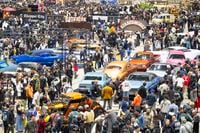
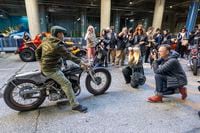
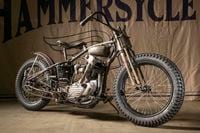
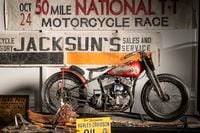
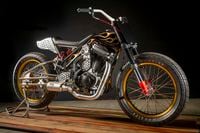


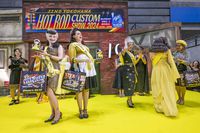
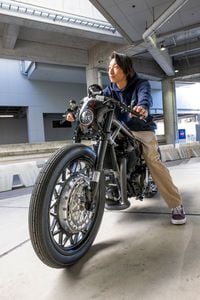
/cloudfront-us-east-1.images.arcpublishing.com/octane/G4MG6OUCJNBSHIS2MVVOTPX65E.jpg)
/cloudfront-us-east-1.images.arcpublishing.com/octane/IIGGWFOTOJGB7DB6DGBXCCMTDY.jpg)
/cloudfront-us-east-1.images.arcpublishing.com/octane/QSTCM6AVEZA5JJBUXNIQ3DSOF4.jpg)
/cloudfront-us-east-1.images.arcpublishing.com/octane/U4I7G625B5DMLF2DVIJDFZVV6M.jpg)
/cloudfront-us-east-1.images.arcpublishing.com/octane/B6XD6LS6IVCQPIU6HXDJSM3FHY.jpg)
/cloudfront-us-east-1.images.arcpublishing.com/octane/ICL63FEDDRDTTMINYICCEYGMDA.jpg)
/cloudfront-us-east-1.images.arcpublishing.com/octane/FCGZHQXRBZFLBAPC5SDIQLVF4I.jpg)
/cloudfront-us-east-1.images.arcpublishing.com/octane/WNOB6LDOIFFHJKPSVIWDYUGOPM.jpg)
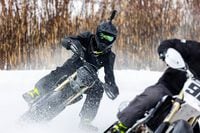
/cloudfront-us-east-1.images.arcpublishing.com/octane/X33NU3E525ECRHXLNUJN2FTRKI.jpg)
/cloudfront-us-east-1.images.arcpublishing.com/octane/6KKT5NNL2JAVBOXMZYS5ZO76YA.jpg)
/cloudfront-us-east-1.images.arcpublishing.com/octane/J5RKG5O455GMPGQRF2OG6LRT7A.jpg)
/cloudfront-us-east-1.images.arcpublishing.com/octane/GX2CIZKQVRH2TATDM26KFG2DAE.jpg)
/cloudfront-us-east-1.images.arcpublishing.com/octane/ZWIDYSAKQZHD5BHREMQILXJCGM.jpg)
/cloudfront-us-east-1.images.arcpublishing.com/octane/CYUHJZCTSJCH3MRAQEIKXK7SCQ.jpg)
/cloudfront-us-east-1.images.arcpublishing.com/octane/LKOFINY56FCXJCANJ5M7ZDQUBY.jpg)
/cloudfront-us-east-1.images.arcpublishing.com/octane/4NBPDACMWJH63JQYJVK3QRBDZI.jpg)
/cloudfront-us-east-1.images.arcpublishing.com/octane/KKHQHRR3FJGX7H2IPU6RALMWG4.jpg)

/cloudfront-us-east-1.images.arcpublishing.com/octane/5IOFS5JAE5FOXMNA23ZRAVVYUU.jpg)
/cloudfront-us-east-1.images.arcpublishing.com/octane/CGXQ3O2VVJF7PGTYR3QICTLDLM.jpg)
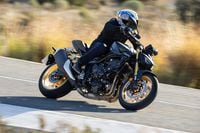
/cloudfront-us-east-1.images.arcpublishing.com/octane/OQVCJOABCFC5NBEF2KIGRCV3XA.jpg)
/cloudfront-us-east-1.images.arcpublishing.com/octane/OPVQ7R4EFNCLRDPSQT4FBZCS2A.jpg)